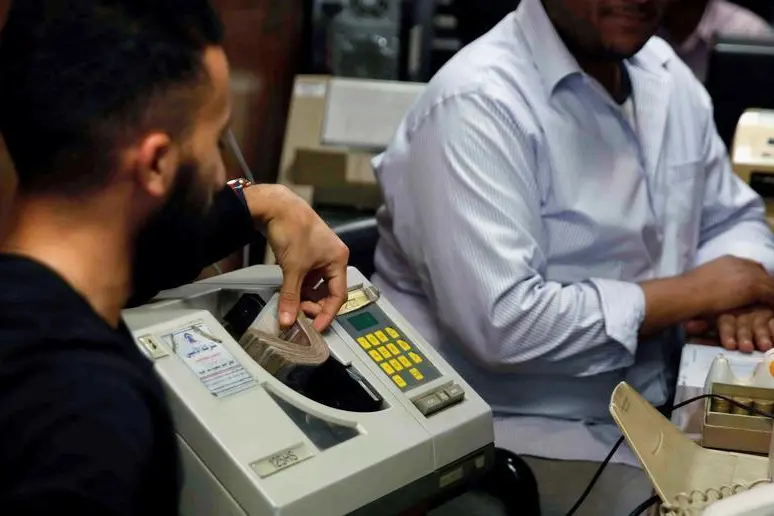PHOTO
CAIRO - Egyptian officials said they expected more inflows and the pound held steady on Thursday, a day after the central bank announced a shift to a more flexible exchange rate and let the currency plunge as Egypt secured an expanded $8 billion IMF programme.
The pound hovered just under 49.5 to the dollar, similar to the price near closing on Wednesday, LSEG data showed. Before Wednesday's de-facto devaluation, steep interest rate hike, the central bank had held the currency for about a year at just under 31 pounds to the dollar.
A more flexible exchange rate, long a key demand from the International Monetary Fund, is seen as crucial for restoring investor confidence in an economy hobbled for the last two years by a foreign currency shortage.
In one sign of improved sentiment, foreign investors resumed purchases of Egyptian treasury bills after a long absence, three bankers said.
The shortage has curbed local business activity and led to backlogs at ports and delays in the government's payments for commodities including wheat.
Prime Minister Mostafa Madbouly said Egypt was planning on big deals to ensure liquidity and would work with merchants to stabilise prices and prioritise foreign currency access for basic commodity importers as the currency shift takes effect.
Egypt expected a total of $20 billion from multilateral and other partners including the IMF, the World Bank and the European Union, Finance Minister Mohamed Maait said.
The government was also committed to a programme to sell state assets and encourage private sector investment.
"We are expecting to execute several deals in the various strategic sectors for an amount close to $3.5 billion," Maait told the American Chamber of Commerce in Cairo. "We are expecting more financing to come through over the short term."
Egypt's international bonds, which had soared on Wednesday before falling back, declined further on Thursday, with the 2033 note down 1.62 cents on the dollar at 81.81 cents, Tradeweb data showed.
Overall, Egypt's sovereign bond prices were trading at early March levels.
'ENOUGH AND MORE'
Egypt has promised a move to a more flexible exchange rate system in the past, only to resume holding the currency at a fixed rate, while much of the economy depended on a black market rate that fell as low as 70 pounds.
Central bank Governor Hassan Abdalla described the black market trading as a "disease" that reflected a lack of trust in the financial system.
"Thankfully, I can stand here today and say we have enough to fulfil our obligations and more," he told reporters at a rare press conference late on Wednesday.
The central bank would still have the ability to intervene, as in other countries, in the case of excess volatility, Abdalla said.
The IMF, which agreed to add $5 billion to its existing $3 billion loan programme with Egypt, has said it is looking for a sustainable and unified exchange rate determined by the market.
Under the programme, Egypt has committed to undertake structural reforms to stabilise prices, manage the debt burden and encourage private-sector growth.
Abdalla said that following a 600 basis point hike on Wednesday, Egyptian interest rates, long among the highest globally, would now be on a "downward track."
'IRON FIST'
Two weeks ago, Egypt signed an investment deal with Emirati sovereign fund ADQ that includes $24 billion payment for rights to develop a prime stretch of Mediterranean coastline.
It also includes the conversion of $11 billion in existing deposits to be used for unspecified projects across Egypt. The Egyptian government said the total of $35 billion would be transferred within two months.
Since early 2022, when the foreign currency shortage worsened, the pound has now lost more than two-thirds of its value against the dollar in a series of staggered devaluations.
The war in Gaza and attacks on Red Sea shipping have put at risk receipts from tourism and Suez Canal traffic, two other main sources of hard currency. Suez Canal revenues had dropped by more than 50%, Maait said, though Egypt's tourism minister said visitor numbers rose at the start of this year.
Remittances from Egyptians working abroad, the country's top single source of foreign currency, slowed sharply last year amid expectations that the pound would fall.
Madbouly said on Thursday that the interior ministry would use an "iron fist" against traders who were channelling remittances outside the banking system.
(Reporting by Nafisa Eltahir, Nayera Abdallah, Tala Ramadan, and Jorgelina do Rosario; Writing by Aidan Lewis; Editing by Tomasz Janowski, Andrew Cawthorne and Richard Chang)





















